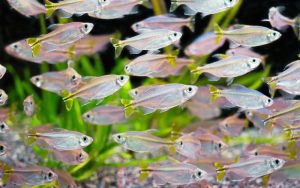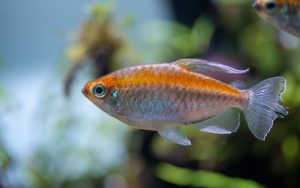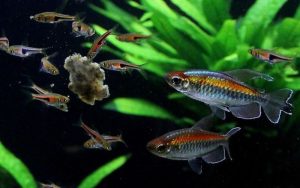What fish eat guppies? Guppies are a good choice for aquarium enthusiasts due to their spirited colors, active personalities, and ease of care.
However, as with any fish species, guppies have their natural predators. If you’re a guppy owner, it’s essential to know what eats guppies and what predators to avoid to ensure the safety and longevity of your fish.
In this article, we’ll explore the seven fish species notorious for preying on guppies and discuss why they threaten your beloved pets.
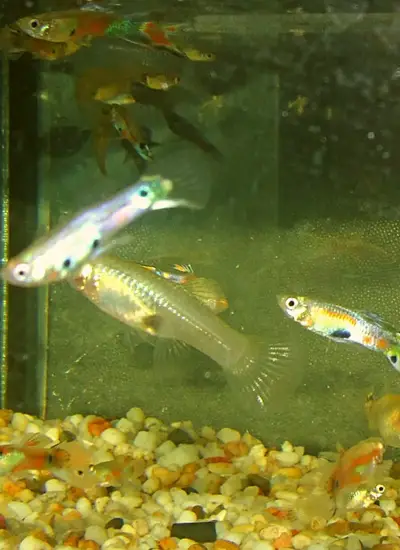
We’ll also share some tips on protecting your guppies from these predators and provide insights into the types of fish that make good tank mates for guppies.
So, if you’re wondering what fish eat guppies tails and want to ensure the safety of your aquatic pets, keep reading to learn more.
Table of Contents
ToggleWhy Some Fish Eat Guppies
Guppies are small and have attractive, flowing fins, which can make them irresistible prey for certain fish species. Additionally, their active nature and bright colors can draw the attention of active hunters.
Awareness of the potential threats guppies face within a community tank is essential. To ensure a peaceful and harmonious aquatic environment,
What Fish Eat Guppies?
Guppies are small, colorful fish that are popular in aquariums. However, they are also preyed upon by a variety of animals in the wild. Some of the most common fish will eat guppies include:
- Large fish: Any large, aggressive fish capable of eating guppies will consider them a potential meal. This includes the Oscars, cichlids, red-tiger sharks, leopard bush fish, barbs, and Gouramis.
- Amphibians: Frogs and turtles are both natural predators of guppies. They will often ambush guppies near the surface of the water.
- Reptiles: Snakes and lizards will also eat adult guppies. They will typically prey on guppies swimming near the water’s bottom.
- Birds: Some birds, such as herons and kingfishers, will eat guppies. They often spot guppies from above and swoop down to catch them.
- Invertebrates: Some invertebrates, such as crayfish and shrimp, will also eat guppies. They will typically prey on guppy babies or small, weak guppies.
In addition to these predators, guppies are also vulnerable to being eaten by other fish in their aquarium. This might happen if the tank is overcrowded or the fish must be compatible. For example, betta fish are known to be aggressive and would eat other fish in their tank.
If you are keeping guppies in an aquarium, choosing compatible tank mates is crucial and ensuring the tank is well-spent. This will help to reduce the risk of your guppies being eaten.
Top 7 Predatory Fish Eat the Guppy Fry
1. Gourami
Gouramis are beautiful tropical fish known for their vibrant colors and unique personalities. However, they tend to become territorial, especially during guppy breeding times. This territorial behavior might lead them to consider the guppies as intruders, causing potential harm.
2. Cichlid
Cichlids are known for their intelligence and intricate social structures. While some species are more peaceful, others can be highly aggressive. Aggressive cichlids might perceive guppies as competitors or threats and may attack them.
3. Angelfish
Angelfish have striking, angelic appearances that captivate aquarists. Despite their serene appearance, they can be predatory and might prey on smaller fish like guppies, especially if they fit in their mouths.
4. Dwarf Pufferfish
Dwarf pufferfish are fascinating creatures with quirky behaviors, but they have a taste for live food, including small fish and invertebrates. Guppies, unfortunately, fall into their menu.
5. Bettas
Bettas, also famous as Siamese fighting fish, are well-known for their beauty and aggressiveness. They are solitary fish and should not be kept with guppies, as they might perceive them as rivals and attack them.
6. Oscars
Oscars are large and powerful fish that require sizeable aquariums. Their size and predatory nature make them unsuitable tank mates for guppies, as this carnivorous fish might see them as a delectable snack.
7. Clown Knife Fish
The clown knife fish is an impressive species often sought after by experienced aquarists. However, they are naturally predatory and will not hesitate to eat smaller fish like guppies.
Fish That Eat Guppy Fry
Swordtails
Swordtails are generally peaceful fish but may view baby guppies as easy prey. While adult swordtails can coexist with guppies, avoiding keeping their fry together is best.
Blue Acara
Blue Acara fish are known to be good parents and fiercely protect their offspring. Unfortunately, they may see guppy fry as a potential food source.
Aggressive and Territorial Fish
Platies
While platies are not significant threats to adult fish, they can be territorial and sometimes nip at guppy fins, causing stress and potential harm.
Male Guppies
Believe it or not, male guppies can be aggressive toward other fish, particularly if they feel their territory is being invaded.
Best Practices for Guppy Care
To ensure the well-being of your guppies, it’s essential to consider the following tips:
- Population Control: Be mindful of your guppy population to prevent overcrowding, which can increase aggression and territorial behavior in the tank.
- Separate Males and Females: If you have both male and female guppies, consider separating them to avoid overbreeding and potential aggression.
- Provide Hiding Spots: Create plenty of hiding spots in the aquarium using plants, rocks, or decorations to give guppies a haven.
- Live Food Alternatives: If you want a varied diet, consider providing live food alternatives like mosquito larvae instead of small guppies.
- Choose Tank Mates Wisely: Before introducing new fish to the tank, research their compatibility with guppies and their temperament.
What Fish Don’t Eat Guppies?
Many species of fish can coexist peacefully with guppies without harming them. Some examples of fish that don’t eat guppies include neon tetras, platies, swordtails, mollies, and cherry barbs.
It is essential to research the temperament and compatibility of any fish species before introducing them to an aquarium with guppies to ensure a harmonious and safe environment for all the fish.
How to Avoid Overpopulation in Guppy Tanks?
To avoid overpopulation in a guppy tank, it is crucial to control guppies’ breeding. Here are some tips:
- Separate males and females: One of the most effective ways to prevent overpopulation is to separate male and female guppies. This can be done by keeping them in separate tanks or by using a divider in the tank. This will prevent them from breeding and producing more offspring.
- Limit the number of females: If you keep both males and females in the same tank, limiting the number of females is vital to prevent overpopulation. A good rule of thumb is to have one male for every two or three females.
- Remove pregnant females: Female guppies can produce dozens of offspring every few weeks. To prevent overpopulation, it is essential to remove pregnant females from the tank and place them in a separate tank until they give birth.
- Control feeding: Overfeeding can lead to faster growth and earlier maturity in guppies, leading to increased breeding. Feeding guppies a balanced diet in the right amounts is important to avoid overfeeding.
By following these tips, you can prevent overpopulation in your guppy tank and ensure a healthy and happy environment for your fish.
What to do With Excess Guppy Fry?
If you have excess guppy fry, there are several options for what to do with them:
1. Sell or give away the fry: Guppies are a popular fish species, and other aquarium enthusiasts may be interested in buying or taking your excess fry. You can post in online forums or social media groups dedicated to aquariums to find interested buyers or adopters.
2. Trade the fry in with a pet store: Many pet stores will accept live fish as trade-ins or for store credit. Check your local pet store to see if they will take your excess guppy fry.
3. Keep the guppy babies in a separate tank: If you have the space and resources, keep the excess guppy fry in an independent tank and raise them until they are mature enough to sell or give away.
4. Release the fry into the wild: This is not suggested, as it can cause environmental problems if the guppy fry is not native to the area. Releasing non-native fish species into the wild is illegal in some areas.
It is important to remember that guppies are prolific breeders, and it is important to plan what to do with excess fry to prevent overpopulation in your tank.
What Fish Eat Guppy Fry?
Many fish species will happily eat baby guppies, a tasty and easy-to-catch snack, if given the opportunity. Guppy fry are small and vulnerable, making them attractive prey for many larger fish.
Some common aquarium fish that may eat guppy fry include:
- Adult Guppies: Adult guppies are known to eat their own fry, especially if there is a scarcity of hiding spots or food in the aquarium.
- Angelfish: Angelfish are known to eat smaller fish, and guppy fry is no exception.
- Tetras: Certain tetra species, like neon tetras, can consume guppy fry.
- Swordtails: Swordtail fish may prey on guppy fry, especially if kept in the same aquarium.
- Mollies: Mollies can eat guppy fry, mainly when the baby guppies are small and easy to capture.
- Gouramis: Some gourami species may see guppy fry as food, mainly if they are small enough.
- Betta Fish (Siamese Fighting Fish): Betta fish are carnivorous and might consider guppy fry a potential meal.
It’s essential to provide ample hiding places for guppy fry to increase their chances of survival if you have other fish species in the same tank. Dense vegetation, floating plants, or separate breeding tanks are often used to protect the fry from potential predators until they grow more extensive and independent.
What Fish Eat Guppy Tails?
In an aquarium, it is not uncommon to witness an exciting display of interaction among different fish species. One such instance is when fish eat guppy tails.
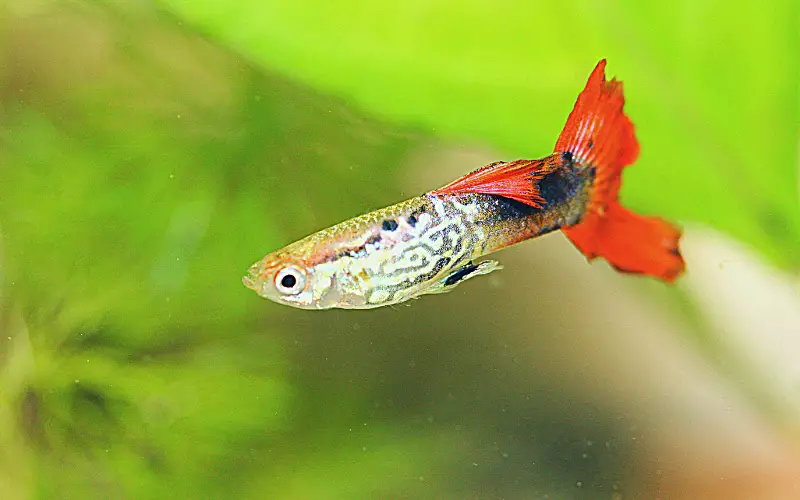
Male guppies, known for their vibrant colors and long tail, often fall victim to the nipping behavior of other fish in the tank. One common culprit is the tetra, a small, agile fish that can easily sneak up on the guppies.
Female guppies, on the other hand, are usually spared from this tail-nipping behavior. While it may seem distressing, it is a natural behavior for certain fish to exhibit. Therefore, keeping guppies with other species is essential to ensure compatibility and adequate space to prevent unnecessary fin damage.
What Fish Don’t Eat Guppies?
Several fish species may not eat guppies, but this might vary depending on factors such as the guppy’s size and temperament of the other fish in the aquarium and the availability of other food sources.
Here are some fish species that are generally considered to be compatible with guppies in a community tank:
- Mollies
- Cardinal tetras
- Glassfish
- Plecos
- Rasboras
- White Cloud Mountain Minnows
- Cory catfish
- Kuhli loaches
- Platies
- Swordtails
These fish are peaceful and non-aggressive and will not bother your guppies. They are also all relatively small, so they are not a threat to larger guppies.
Some other fish that can be kept with guppies include:
- Neon tetras
- Ember tetras
- Rummynose tetras
- Rosy tetras
- Penguin tetras
- Zebra danios
- White skirt tetras
- Harlequin rasboras
- Ember rasboras
These fish are all small and peaceful, making good companions for guppies. However, it is essential to note that some fish, such as neon tetras and ember tetras, may eat guppy fry. If you plan to breed guppies, you must provide plenty of hideouts for the guppy fry to avoid being eaten.
It is also important to avoid keeping guppies with bigger fish species, more aggressive fish, such as cichlids, goldfish, or bettas. These fish may see guppies as prey and will not hesitate to eat them.
When choosing tank mates for your guppies, it is essential to consider the size, temperament, and dietary guppies needs of the fish. You can create a peaceful community tank by choosing compatible fish.
How to Choose Compatible Tank Mates for Your Guppies?
Here are some tips on how to choose the best fish tank mates for your guppies so you won’t have to worry:
- Consider the size of the fish. Guppies are small fish, so you’ll want to choose similarly sized tank mates. Larger fish may see guppies as prey and could injure or even kill them.
- Think about the temperament of the fish. Guppies are peaceful fish, so you’ll want to choose tank mates that are also peaceful. Aggressive fish, such as cichlids, could bully or even kill guppies.
- Take into account the water conditions. Guppies are adaptable fish but do best in water with a pH of 7.0-7.8 and a temperature of 72-78 degrees Fahrenheit. Make sure that your tank mates can also thrive in these water conditions.
- Consider the diet of the fish. Guppies are omnivores and eat various foods, including flakes, live food, and plants. Make sure that any tank mates you choose have similar dietary needs.
- Think about the space requirements of the fish. Guppies don’t need much space, but they need enough room to swim and explore. Ensure your tank is big enough for all the fish you plan to keep.
These fish are all peaceful and non-aggressive, and they will make good companions for your guppies. They also have similar water requirements and dietary needs to thrive in the same tank.
If you are looking for tank mates to help control algae in your aquarium, consider adding some snails or shrimp. These invertebrates are not only peaceful and non-aggressive, but they can also help to keep your tank clean.
No matter which tank mates you choose, it is essential to do your research to ensure they are compatible with guppies. Following these tips can create a peaceful and thriving community tank.
Commonly Asked Questions (FAQs)
Can betta fish live with guppies?
No, betta fish are solitary and territorial, making them unsuitable tank mates for guppies.
Do platies attack guppies?
While not known for direct attacks, platies can be territorial and might nip at guppy fins.
Will angelfish eat guppy fry?
Yes, angelfish may see guppy fry as a potential food source.
What should I feed my guppy fry?
Guppy fry can be fed with specialized fry food or finely crushed flakes.
How many guppies should I keep together?
Keeping a reasonable number of guppies is best, allowing for a spacious and harmonious environment.
Are guppies safe with gourami?
Guppies can generally be kept with gourami as long as the gourami is not aggressive toward other fish. Monitoring their interactions and providing plenty of hiding spots in the tank is always a good idea to reduce any potential aggression.
Can angelfish eat guppies?
Yes, angelfish can eat adult guppies if they catch them. Angelfish are known to be aggressive and quick fish, and they may see guppies as a potential meal. It is best to keep them separate to avoid harming the guppies.
Do betta fish eat guppies?
Betta fish are known to be hostile toward other fish and may attack other fish in the tank, including guppies. Keeping betta fish with guppies is not recommended as they threaten their safety.
Are cichlids a threat to guppies?
Yes, cichlids can pose a threat to guppies. Cichlids are known to be aggressive fish and may see guppies as potential prey. It is best to keep them separate to ensure the safety of the guppies.
What other fish can eat guppies?
In addition to gourami, angelfish, betta fish, and cichlids, other fish that can eat guppies include larger predatory fish such as swordtails and platies. It is essential to know the potential risks when keeping these fish together.
Do swordtail fish eat guppies?
Swordtail fish are known to eat smaller fish, including guppies. While they may not actively hunt down guppies, if the opportunity arises, they may feed on guppies if they catch them.
Can large fish eat guppies?
Yes, larger predatory fish have the potential to eat guppies. Guppies are small and can be seen as food by larger fish. It is essential to consider size compatibility when choosing tank mates for guppies.
Is there a list of fish that can eat guppies?
While there is no definitive list of fish that can eat guppies, there are several known species, such as gourami, angelfish, betta fish, cichlids, swordtails, and platies, that have been reported to eat guppies in certain situations.
Can guppies be kept with plants?
Guppies are generally good at eating algae and can be beneficial in planted tanks. However, they may also feed on plant material, primarily if they lack enough food. It is essential to balance and provide a varied diet for your guppies to avoid excessive plant consumption.
Conclusion
So, Do you know what fish eat guppies? In conclusion, if you’re a guppy owner, it’s essential to understand what fish eat guppies and what predators to watch out for. Knowing what your guppies’ natural predators are can help you take steps to protect them and keep them healthy. Additionally, providing your guppies with a balanced and varied diet can ensure their optimal growth and well-being. Remember, guppies need proper nutrition to thrive like any other living creature.
You can make a safe and healthy environment for your beloved guppies by researching and taking appropriate precautions. So, whether you’re a seasoned guppy owner or just starting, keep in mind what eats guppies and what fish eat guppies, and you’ll be well on your way to being a responsible and successful guppy keeper.
You might also like
- Will Rope Fish Eat Guppies: 5 Factors for Best Compatibility
- Guppies and Tetras: 3 Secrets to the Ultimate Harmony!
- Can Male Guppies Live Together: (5 Expert Tips Say Yes!)
- Why Are My Guppies Dying Off: (5 Major Causes & Best Solutions)
- Does Guppies Eat Plants: 7 Best Live Plants for Guppies Tank!
- What Does Guppies Eat in the Wild: (A Comprehensive Guide)
- Can You Keep Shrimp with Guppies: (The Shocking Truth)
- Mosquitofish Vs Guppy: 5 Surprising Facts You Never Knew!
- Fish That Will Eat Guppy Fry: The 7 Most Ruthless Predators!


